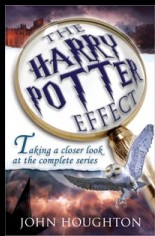Christians have been notoriously divided over Harry. Some have denounced the stories as a dangerously attractive introduction to the world of the occult. Others welcome their celebration of love over evil, to say nothing of their literary success in a world that many feared had given up on books altogether.
John Houghton looks at 'the Harry Potter effect', both in the wider culture and in the Christian community. His considered critique offers timely and valuable insight for fans and detractors alike, as well as parents, teachers and all those who work with children.
Contents
1. At Face Value
2. Just Imagine
3. The World Between Worlds
4. The Mythic Journey
5. Talking of Witches
6. Worlds Apart
7. Deathly Horrors
8. The Politics of Power
9. A Better Story
10. Train Up a Child
Appendix Information
Pages: 126 Paperback
Extra Features
Includes a 2 page appendix of some Harry Potter names and places.
John Houghton is a children's novelist and a cultural commentator on the relationship between faith and society.
From the Preface
With the publication of Harry Potter and the Deathly Hallows we had the long awaited dénouement and the resolution of the mystery that J K Rowling had teased us with for the previous ten years. Finally we knew the whole story and all the important questions were answered.
The author could justly celebrate. Some of her critics had to eat their words. Others now wish to consider the impact of the series on our lives and the lives of our children. What is the Harry Potter effect? To what extent have the books influenced our basic assumptions, our beliefs and our behaviour? How much has it changed the way we think? Why is it the greatest publishing phenomenon of our generation? Sales of the first six books have exceeded 325 million copies and this seventh volume became another record-breaking bestseller on its first day. The first five films have grossed over 4 billion dollars, with similar success to follow. That is to say nothing of the merchandising billions and the Harry Potter theme park being built in Florida. The author herself is reported to have become a billionaire on the basis of her books and has received the OBE.
Translated into many languages, Harry Potter is a phenomenon on a global scale and is set to remain so for a long time to come. Part of the reason for that success is that the Harry Potter books are not so much children’s books as books about children and teenagers that deal with the predominantly adult themes of love and death. As such, they have accessed the older teens and adult markets just as much as the traditional children’s market. Using a classically mythic structure and telling the stories with flair, imagination and wit, Rowling has pressed all the right cultural buttons too. In Harry Potter we find not only some rattling good yarns but an exploration of alienation and fear. We observe the contemporary political and social effects of terrorism, state paranoia and media manipulation, along with rising fascism. Rowling’s world also appeals to our desire to escape the humdrum impersonality of consumerism and soulless technology. Instead, we are drawn into a nostalgic world of fantasy and romance, a gothic mix of the fantastic and the macabre, driven along by a political power struggle. In this world of colourful magic we find fulfilled our desire for heroes, for courage and hope.
Has J K Rowling done more? Have her books had a spiritual impact? Are our beliefs, our values, modified as a result of reading them? Has she encouraged the growth of witchcraft and the occult, or has she subtly promoted the Christian faith? What impact has she had on our world view? Have the horror and macabre elements of her stories developed, disturbed, or hardened children’s emotional development? Has she weaned them away from the cynicism of Playstation-type war games? Do her books restore imagination to a generation dulled by excessively leftbrained school examinations? Can we commend the books and films to our children, or should we express caution, or even impose an outright ban? In a world saturated with media entertainment, should we even care?
In my first reflection on the phenomenon, A Closer Look at Harry Potter (Kingsway Publications 2001), I commented on the first four Harry Potter books. In this second volume, while covering some similar ground, I have explored the entire Harry Potter series and the subsequent developments in our culture. As before, those who desire an unqualified condemnation or commendation of Rowling’s work had better look elsewhere; they will be disappointed. Those who wish to discern between good and evil in our current generation and who want to produce culturally literate, wise, God-respecting children who know how to have fun without regrets and who can make a positive impact on their world, should read on.
ISBN: 9781842913628
Catalogue code: N/A
Publisher: KINGSWAY - published 07/09/2007
Format: Paperback

